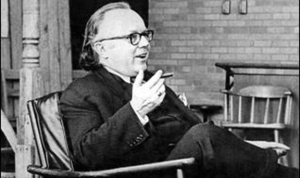
Russell Kirk was a literary critic, historian, and political theorist. He passionately believed that literature was an essential part of one’s education, since it exposes students to “splendor and tragedy of the human condition, to constant moral insights, to the spectacle of human history, to love of community and country, to the achievements of right reason.”
Here are his reasons for reading and teaching fantasy, along with a few recommendations. From The Intellectual Conservative:
If young people are to begin to understand themselves, and to understand other people, and to know the laws which govern our nature, they ought to be encouraged to read allegory, fable, myth, and parable. All things begin and end in mystery. Out of tales of wonder comes awe—and the beginnings of philosophy. The images of fantasy move us lifelong. Sir Osbert Sitwell, when asked what lines of poetry had most moved him in all his life, replied candidly, “Froggie would a-wooing go, whether his mother would let him or no.”
So here are my fantastic recommendations—
John Bunyan, The Pilgrim’s Progress (1678-84)
William Shakespeare, A Midsummer Night’s Dream (1596-96)
Nathaniel Hawthorne, The House of the Seven Gables (1851) or (perhaps preferably) The Marble Faun (1860)
Robert Louis Stevenson, Kidnapped (1886) or one of his volumes of short stories
Ray Bradbury, Something Wicked This Way Comes (1962) or Dandelion Wine (1957) (Bradbury is something far better than an accomplished “science fiction writer;” he is a man of remarkable ethical insights and great power of style.)
Walter Scott, Old Mortality (1816) or The Heart of Midlothian (1818), (These are much more important romances than is Ivanhoe (1819), so commonly taught).
Select poems of Spenser, Burns, Coleridge, Wordsworth, Shelley, Tennyson, Whittier, Longfellow, Chesterton, Kipling, Masefield, Yeats, Frost, and others—selected with and eye to the marvelous and the mysterious.




